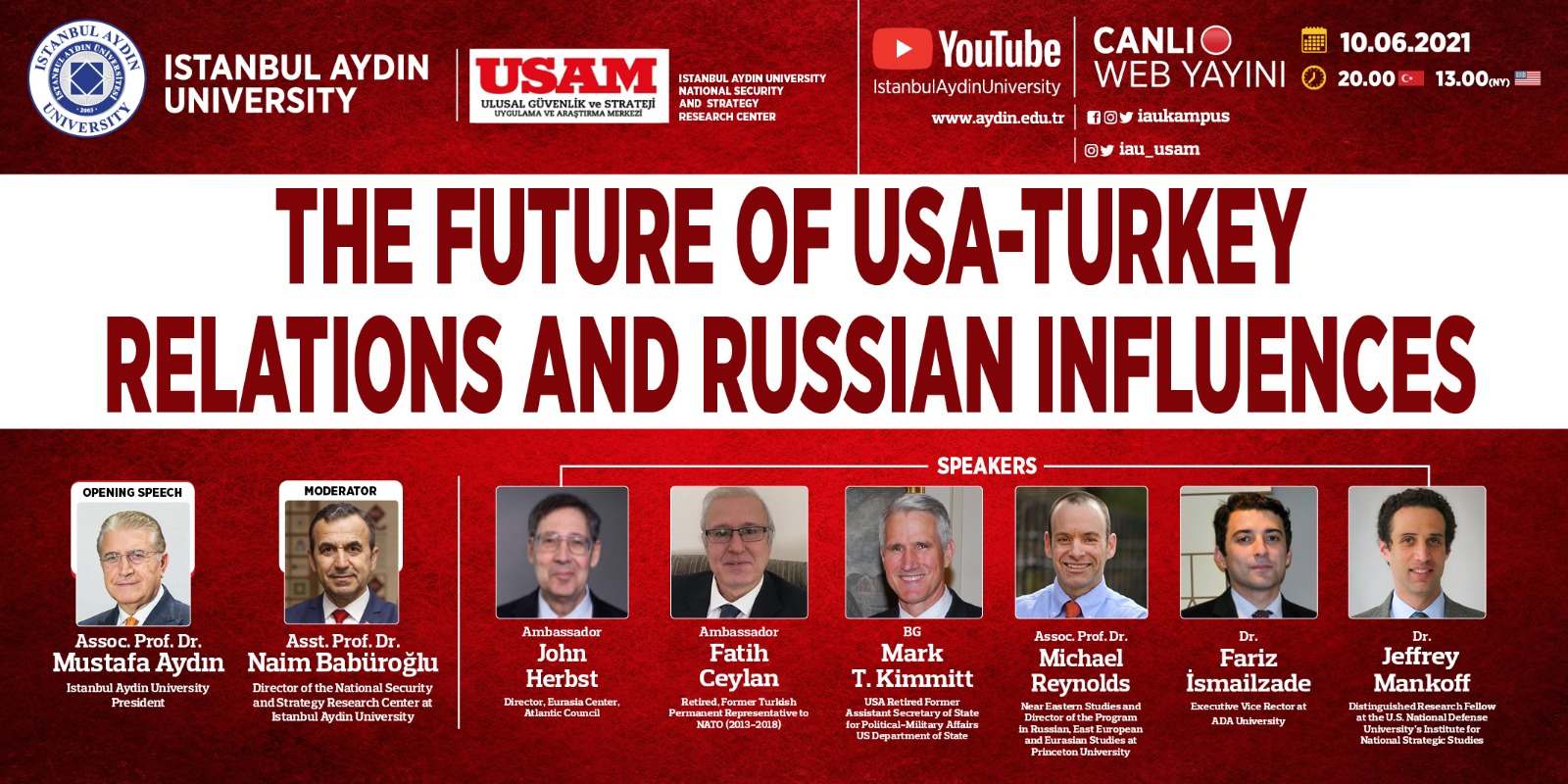
![]()
"The Future of USA-Turkey Relations and Russian Influences"
"The Future of USA-Turkey Relations and Russian Influences" titled webinar was accomplished by Istanbul Aydın University National Security and Strategy Research Center (USAM) on June 10th, 2021. The webinar began with opening speech of Assoc. Prof. Dr. Mustafa Aydın, Istanbul Aydın University President and was moderated by Asst. Prof. Dr. Naim Babüroğlu, Director of USAM. Retired Amb. Fatih Ceylan (Former Turkish Permanent Representative to NATO 2013-2018), Retired Amb. John Herbst (Director Eurasia Center, Atlantic Council), Retired BG Mark T. Kimmitt (USA Retired Former Assistant Secretary of State for Political-Military Affairs US Department of State), Assoc. Prof. Dr. Michael Reynolds (Near Eastern Studies and Director of the Program in Russian, East European and Eurasian Studies at Princeton University), Dr. Fariz İsmailzade (Executive Vice Rector at ADA University), Dr. Jeff Mankoff (Distinguished Research Fellow at the U.S. National Defense University's Institute for National Strategic Studies) participated in the webinar with significant analyses and contrubutions.
Turkey-USA relations on different dimensions and on the involvement of Russian in these relations were analyzed. The reflections on Turkey of Russia-USA relations based on conflict of interests were evaluated by the participants. The other topics which are the Syrian Crisis, YPG/PKK terrorist organization, S-400 air defense issue were also discussed within the perspective of Turkey-USA-NATO alliances. Participants projected the effects of meeting between Turkey Republic President Recep Tayyip Erdoğan and US President John Biden on Transatlantic relations.

Retired Amb. Fatih Ceylan: The biggest issue nowadays started with the purchase of the Russian-made S-400 Air Defense and Missile system. That is not something new it is an inheritance from the Obama period when Turkey was seeking developed a missile and integrated air and missile defense architecture.
Retired BG Mark T. Kimmitt: The relationship between the US and Turkey has been strained over the past few years, not simply because of S-400, F-35, YPG/PKK but also the holding of Gulen in Pennsylvania and a number of other issues. But I think it is important to recognize that while this has strained the relationship it's also important to stand back and realize that countries need to satisfy their own national interests. Certainly, we have to acknowledge the interests of our friends and our allies but at the end of the day as the old diplomatic saying goes we don't have friends, we have interests. Now we certainly understand the interests of Turkey in terms of understanding their territorial integrity and wanting to avoid the situation
Assoc. Prof. Dr. Michael Reynolds: Both Turkey and the USA have made a number of serious errors with regard to each other in the past several years, and these errors have resulted in worsening relations between the two. But I think we have to stand back and remember whether that I think made it possible for both sides to make those errors. That is the role of Russia in this when people particularly Washington at least think of Turkey we have very much a mythological image of Turkey that we created during the cold war.
Dr. Fariz Ismailzade: I am somewhat optimistic about this meeting because I think both US and Turkey have understood that this kind of problematic relationship is not serving any good to both sides, so I think they will try the leaders will try to find common grounds for cooperation. The US has been absent from the region of South Caucasus from Post-Soviet space and we have the feeling that the US is trying to come back somewhat with the help of active diplomacy. Turkey could be an ally in that regard. Turkey is already very active in the region Central Asia, Afghanistan, South Caucasus, Middle East, Eastern Mediterranean.
Dr. Jeffrey Mannkof: If you think about the Russo-Turkish relationship over the longer term a lot of explanatory power comes from this duality in the natüre of Turkey's interests that on the one hand benefits from having the security guarantees the political alignment with NATO and with its Western partners. On the other hand, as it has developed in the post-cold war period as an increasingly independent strategically autonomous regional power. It has thought for ways to develop more room for maneuver for itself.
Assoc. Prof. Dr. Mustafa Aydın: I do not believe as well the long history of the United States and Turkey relations although it must sometimes have been strained will never come to a point that we do not have any relations. The up and downs in a relationship maybe sometimes make us consider what we should do in this step forward. We have very common values. We have strong relations in terms of NATO. Turkey has to generate politics in term of the region that we will in. I want to thank for all the valuable contributions of our participant.
The international webinar of "The Future of USA-Turkey Relations and Russian Influences" was accomplished by valueable contributions of Mr. Aydın, Mr. Babüroğlu, Mr. Ceylan, Mr. Herbst, Mr. Kimmitt, Mr. İsmailzade, Mr. Mankoff, Mr. Reynolds.